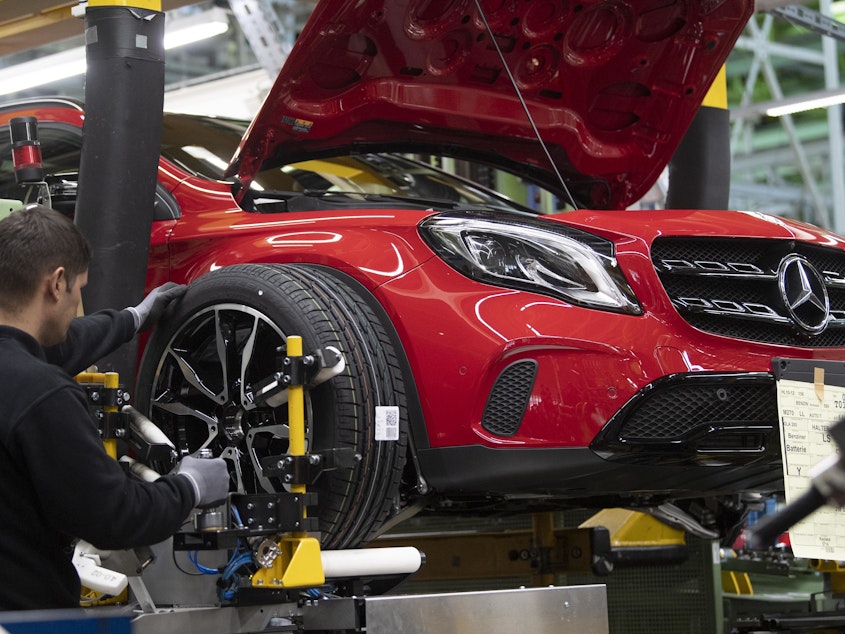Are We Firing Too Many People?

Over the last couple weeks, nearly ten million Americans have filed for unemployment. It's easily the worst two job weeks in U.S. history. And it might not be over. According to an estimate from economists at the Federal Reserve of St. Louis, 47 million Americans could be laid off during the pandemic.
Editor's note: This is an excerpt of Planet Money's newsletter. You can sign up here.
Germany hasn't released its number of unemployment claims recently enough for us to compare it to the huge U.S. surge, but they are likely to be way lower. That's because Germany is handling the same crisis differently. They have a system aimed at preventing mass layoffs. It's called Kurzarbeit, which translates to "short-time work." Under the program, when companies declare they're under financial distress, the government helps them pay their workers. The workers reduce their work week, and the government pays them typically about ⅔ of their lost wages. In this way, everyone shares the pain of the downturn and the system safeguards employment.
Using the short-time work program, which has existed for over a century, Germans have weathered everything from world wars to financial crises. "Unemployment did not rise in Germany after the 2008 financial crisis like it did in other advanced economies," says Anke Hassel, an economist at the Hertie School in Berlin. "It was definitely due in large part to the Kurzarbeit because companies did not have to fire their workers."
The Kurzarbeit system makes particular sense in Germany, which is dominated by skill-intensive manufacturing. Many German workers spend years in apprenticeship programs, cultivating specialized skills. Preserving matches between employers and employees is particularly valuable with this much investment in training. During the depths of the Great Recession, four-fifths of all German workers getting Kurzarbeit subsidies were in the manufacturing sector.
Sponsored
Rüdiger Bachmann, a German-American economist at Notre Dame, argues that the German system, in maintaining the links between employers and employees, allows the economy to recover faster once a crisis is over. In the U.S. system, companies have to invest time and money finding and training workers all over again.
Anke Hassel stresses that Kurzarbeit is not necessarily more expensive than the U.S.-style system of mass layoffs. That's because, in the U.S. system, the government still provides unemployment benefits. Germany, too, has a parallel system of unemployment insurance for those laid off. German companies can also fire their workers, American-style, and leave them to receive government assistance through other means. It is, of course, cheaper than keeping people on part time. But many German companies are going the keep-their-workers-employed route. In recent weeks, half a million of them have filed for Kurzarbeit assistance.
Historically, German companies outside of specialized manufacturing have been less likely to use Kurzarbeit. It makes sense because many jobs, especially in the service sector, don't require as much training. For example, a cashier at the grocery store or a server at a restaurant. Companies in these sectors have an easier time hiring and training workers once the economy rebounds. But Bachmann argues saving matches is even important in this sector. "There's the burger joint, but there's also the Asian fusion restaurant that figured out something very specific that provides welfare to customers," he says. "We would like to have this reopened as fast as we can after the crisis."
France, Denmark, Britain, and other nations have adopted similar programs. One economist even called Kurzarbeit one of Germany's "most successful exports." Anke Hassel is based in Berlin, and when she reads about the massive spike of unemployment in the United States, she's a bit perplexed we're doing it this way. "Well, from a European perspective, it doesn't look good," she says. Even though unemployed Americans are getting checks from the government, she says, they're still dealing with the immense insecurity, anxiety, and vulnerability that comes from being jobless. This mass of unemployed people will end up costing taxpayers in numerous ways.
The U.S. may not be that far away from developing a Kurzarbeit system. The $2 trillion coronavirus relief package doubles down on traditional unemployment insurance, but it also includes a measure that might be considered Kurzarbeit-lite. The act created a $349 billion "Paycheck Protection Program." Under this program, small businesses can apply for loans at private banks, and these loans are forgivable if companies keep their employees on the payroll.
Sponsored
Bachmann believes this is a step in the right direction, but he questions why this is being administered through private banks, as opposed to directly from the government, and why it's limited to only small businesses. He thinks this will only slow down and reduce the benefits of the system. But it may be the start of a different way of thinking about how to weather an economic shock.
Did you enjoy this newsletter? Well, it looks even better in your inbox! You can sign up here. [Copyright 2020 NPR]



